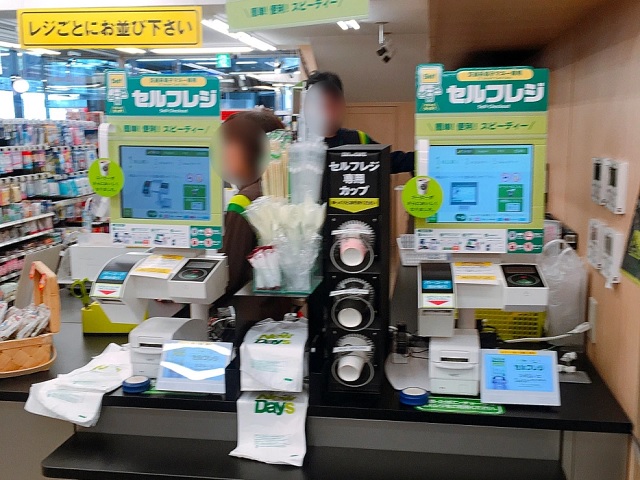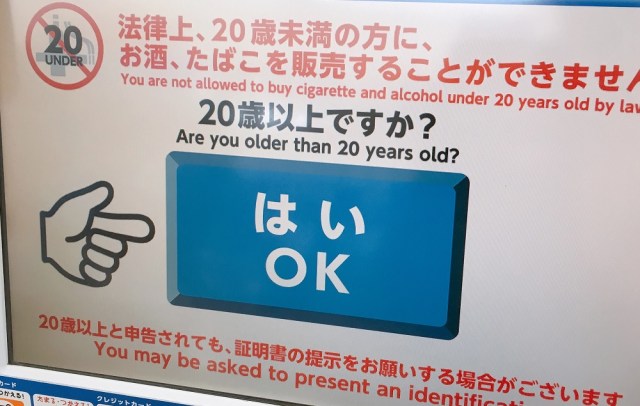
New rule for convenience stores goes into effect on day of announcement, but there’s some equipment shops and shoppers need first.
It may have taken a while for the idea of self-checkout at retail stores in Japan to gain traction, but it’s becoming increasingly common. As shoppers get used to the systems they’re enjoying the upsides of shorter lines and quicker transactions, and self-checkout is about to get even more convenient in Japan.
In a press conference held on January 31, Minister of Digital Affairs Taro Kono announced that convenience stores in Japan can start selling alcohol and tobacco products through self-checkout registers. What’s more, while new policies announced by the Japanese government often don’t go into effect until the next spring (when the administrative year starts), Kono said that convenience stores can start selling alcohol and tobacco through self-check-out immediately, as long as they’re set up for compliance with the corresponding required regulations.
Under Japanese law, a person must be at least 20 years old in order to purchase alcohol or tobacco. In order to confirm the buyer’s age, convenience stores that want to sell such products through self-check-out will have to equip their registers with a device that can scan either the purchaser’s driver’s license or My Number Card, a government-issued ID card that’s not yet mandatory and which the Japanese government is eager to accelerate the adoption of.
You could argue that the system is ripe for abuse. Since the device is just a card reader, there’s no machine or human checking to see that the photo on the card matches the person buying the booze or cigarettes. So really, it’s not confirming that the buyer is 20 or older so much as confirming that they have a card from someone 20 or older, who may or may not really be the person making the purchase.
That said, in the case of alcohol, self-check-out registers equipped with card readers would most likely be a stronger deterrent to underage drinking than how it’s sold when a store clerk is manning the register. In Japan, if a convenience store clerks sees that you have beer, sake, or some other kind of alcoholic beverage among the items you’re purchasing, they’ll ask you to confirm your age by pressing a button on the register’s monitor. The exact phrasing varies by store chain/register manufacturer, but it invariably is some variation on “Are you 20 years or older?”, and generally the one and only button for you to press is the one that says “Yes.” Hit that button, and you’re good to go; in the 20-plus years I’ve lived in Japan, I’ve seen someone get asked to show their ID to prove their age exactly one time.
▼ It says “You may be asked to present identification,” but, no, you will not be asked.
So while buying booze via self-check-out comes with the possibility that underage teens will use an older friend’s card, or “borrow” their parents’, it’s still a step up in strictness from running the whole thing on the honor system. There’s also the fact that while they’re not nearly as common as they used to be, Japan has sold alcoholic beverages in vending machines, with no ID check required, for generations.
On the other hand, it’s been many years since Japan began requiring cigarette vending machines have a card reader to confirm the buyer’s age. Cigarettes in convenience stores, though, are always stocked behind the counter, and customers have to ask the clerk for the specific product they want. Because of that, there doesn’t seem to be much advantage, on the consumer side, to purchasing them though self-check-out, since buyers would first have to wait in line at a manned register anyway. Rearranging stores so that tobacco products are stocked in places where customers can grab them themselves would address that, but it’s unclear if that’s allowed under current laws, or if stores would even want to do so considering the increased shoplifting risk.
As for why, this change in happening, in November the Japanese government approved new legislation allowing the use of the My Number Card for age verification in commerce applications, and the Japan Franchise Association, whose members include convenience store chains, has now completed the necessary compliance work. “This will be an opportunity to experience the convenience of the My Number Card,” says Kono of the new self-check-out allowances, and it’s likely this will be a less divisive way to do that than his other idea of requiring people to have a My Number Card before they can go to a concert in Japan.
Source: The Sankei News
Photos ©SoraNews24
● Want to hear about SoraNews24’s latest articles as soon as they’re published? Follow us on Facebook and Twitter!


 How to use Japanese convenience store Lawson’s self-checkout terminals
How to use Japanese convenience store Lawson’s self-checkout terminals Japanese confectionary chain Chateraise opens first 24-hour branch with self-checkout
Japanese confectionary chain Chateraise opens first 24-hour branch with self-checkout Floating hologram registers coming to Japanese convenience stores【Video】
Floating hologram registers coming to Japanese convenience stores【Video】 Register Rage: Osaka City Official Arrested for Allegedly Punching Out Register’s LCD Display
Register Rage: Osaka City Official Arrested for Allegedly Punching Out Register’s LCD Display Revolutionary new A.I. self-checkout system in Japan calculates all your items with one glance
Revolutionary new A.I. self-checkout system in Japan calculates all your items with one glance Starbucks Japan unveils new sakura cherry blossom collection for hanami season 2026
Starbucks Japan unveils new sakura cherry blossom collection for hanami season 2026 One Piece creator has hidden secret of anime treasure’s identity in chest at bottom of real-world ocean
One Piece creator has hidden secret of anime treasure’s identity in chest at bottom of real-world ocean Is Tokyo Station’s startlingly expensive wagyu bento boxed lunch worth its high price?[Taste test]
Is Tokyo Station’s startlingly expensive wagyu bento boxed lunch worth its high price?[Taste test] Starbucks Japan releases new sakura goods and drinkware for cherry blossom season 2026
Starbucks Japan releases new sakura goods and drinkware for cherry blossom season 2026 It’s Japanese commercial time! Watch the best ads from 2017 in one glossy 4K video
It’s Japanese commercial time! Watch the best ads from 2017 in one glossy 4K video The best Hobonichi diaries, covers and stationery for 2026
The best Hobonichi diaries, covers and stationery for 2026 Viral Japanese cheesecake from Osaka has a lesser known rival called Aunt Wanda
Viral Japanese cheesecake from Osaka has a lesser known rival called Aunt Wanda Tokyo street sweets: The must-snack treats of Nakano’s Refutei
Tokyo street sweets: The must-snack treats of Nakano’s Refutei 10 beautiful packaging designs from Japan
10 beautiful packaging designs from Japan The Gentleman’s Cheese Beef Bowl, invented by Mr. Sato
The Gentleman’s Cheese Beef Bowl, invented by Mr. Sato Starbucks Japan releases first-ever Hinamatsuri Girls’ Day Frappuccino
Starbucks Japan releases first-ever Hinamatsuri Girls’ Day Frappuccino Japanese restaurant chain serves Dragon Ball donuts and Senzu Beans this spring
Japanese restaurant chain serves Dragon Ball donuts and Senzu Beans this spring Japan Extreme Budget Travel! A trip from Tokyo to Izumo for just 30,000 yen [Part 1]
Japan Extreme Budget Travel! A trip from Tokyo to Izumo for just 30,000 yen [Part 1] Highest Starbucks in Japan set to open this spring in the Tokyo sky
Highest Starbucks in Japan set to open this spring in the Tokyo sky Japan’s craziest burger chain takes menchi katsu to new extreme levels
Japan’s craziest burger chain takes menchi katsu to new extreme levels Japan Extreme Budget Travel! A trip from Tokyo to Izumo for just 30,000 yen [Part 2]
Japan Extreme Budget Travel! A trip from Tokyo to Izumo for just 30,000 yen [Part 2] Japan has only one airport named after a samurai, so let’s check out Kochi Ryoma【Photos】
Japan has only one airport named after a samurai, so let’s check out Kochi Ryoma【Photos】 Japanese drugstore sells onigiri at pre-stupid era prices, but how do they compare to 7-Eleven?
Japanese drugstore sells onigiri at pre-stupid era prices, but how do they compare to 7-Eleven? Which convenience store onigiri rice balls are the most popular? Survey reveals surprising results
Which convenience store onigiri rice balls are the most popular? Survey reveals surprising results Japan’s newest Shinkansen has no seats…or passengers [Video]
Japan’s newest Shinkansen has no seats…or passengers [Video] Foreigners accounting for over 80 percent of off-course skiers needing rescue in Japan’s Hokkaido
Foreigners accounting for over 80 percent of off-course skiers needing rescue in Japan’s Hokkaido Super-salty pizza sends six kids to the hospital in Japan, linguistics blamed
Super-salty pizza sends six kids to the hospital in Japan, linguistics blamed Starbucks Japan unveils new sakura Frappuccino for cherry blossom season 2026
Starbucks Japan unveils new sakura Frappuccino for cherry blossom season 2026 Foreign tourists in Japan will get free Shinkansen tickets to promote regional tourism
Foreign tourists in Japan will get free Shinkansen tickets to promote regional tourism The 10 most annoying things foreign tourists do on Japanese trains, according to locals
The 10 most annoying things foreign tourists do on Japanese trains, according to locals Take a trip to Japan’s Dododo Land, the most irritating place on Earth
Take a trip to Japan’s Dododo Land, the most irritating place on Earth Naruto and Converse team up for new line of shinobi sneakers[Photos]
Naruto and Converse team up for new line of shinobi sneakers[Photos] Is China’s don’t-go-to-Japan warning affecting the lines at a popular Tokyo gyukatsu restaurant?
Is China’s don’t-go-to-Japan warning affecting the lines at a popular Tokyo gyukatsu restaurant? Survey asks foreign tourists what bothered them in Japan, more than half gave same answer
Survey asks foreign tourists what bothered them in Japan, more than half gave same answer Japan’s human washing machines will go on sale to general public, demos to be held in Tokyo
Japan’s human washing machines will go on sale to general public, demos to be held in Tokyo Starbucks Japan releases new drinkware and goods for Valentine’s Day
Starbucks Japan releases new drinkware and goods for Valentine’s Day We deeply regret going into this tunnel on our walk in the mountains of Japan
We deeply regret going into this tunnel on our walk in the mountains of Japan Studio Ghibli releases Kodama forest spirits from Princess Mononoke to light up your home
Studio Ghibli releases Kodama forest spirits from Princess Mononoke to light up your home Major Japanese hotel chain says reservations via overseas booking sites may not be valid
Major Japanese hotel chain says reservations via overseas booking sites may not be valid Put sesame oil in your coffee? Japanese maker says it’s the best way to start your day【Taste test】
Put sesame oil in your coffee? Japanese maker says it’s the best way to start your day【Taste test】 No more using real katana for tourism activities, Japan’s National Police Agency says
No more using real katana for tourism activities, Japan’s National Police Agency says Hyogo man arrested for backhanding cash register while verifying his age
Hyogo man arrested for backhanding cash register while verifying his age How to use the new floating hologram registers at 7-Eleven
How to use the new floating hologram registers at 7-Eleven Foreign tourist arrested in Japan for striking convenience store clerk over 3-yen bag altercation
Foreign tourist arrested in Japan for striking convenience store clerk over 3-yen bag altercation Lawson begins first self-service convenience store in Tokyo, no line-ups necessary
Lawson begins first self-service convenience store in Tokyo, no line-ups necessary 7-Eleven thrills Japan by announcing self-serve draft beer machines, then breaks our hearts
7-Eleven thrills Japan by announcing self-serve draft beer machines, then breaks our hearts How to use Japan’s new self-checkout supermarket carts
How to use Japan’s new self-checkout supermarket carts Netizens annoyed that Japan Self-Defense Forces had to announce that aid workers can use restrooms
Netizens annoyed that Japan Self-Defense Forces had to announce that aid workers can use restrooms Japan now has a convenience store that can be towed by a car【Video】
Japan now has a convenience store that can be towed by a car【Video】 One of Japan’s biggest convenience store chains testing walk-through cashless payment system
One of Japan’s biggest convenience store chains testing walk-through cashless payment system What’s it like to shop at Family Mart’s first “unmanned convenience store” in Japan?
What’s it like to shop at Family Mart’s first “unmanned convenience store” in Japan? We try Japan’s most exclusive beer at the U.S. Navy base in Yokosuka【Taste test】
We try Japan’s most exclusive beer at the U.S. Navy base in Yokosuka【Taste test】 Daily Yamazaki is your one-stop lunch senbero stop! 【Japan’s Best Home Senbero】
Daily Yamazaki is your one-stop lunch senbero stop! 【Japan’s Best Home Senbero】